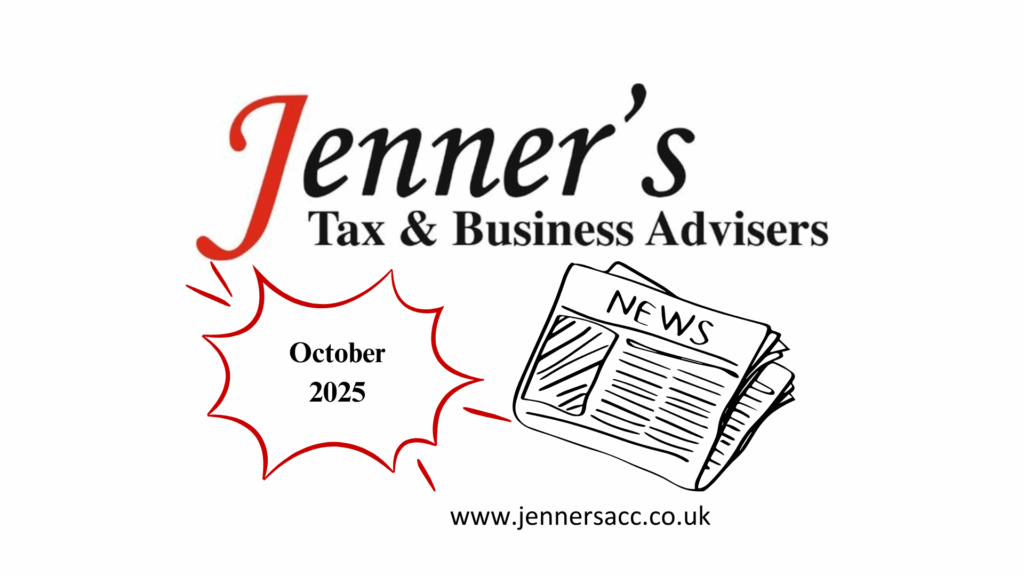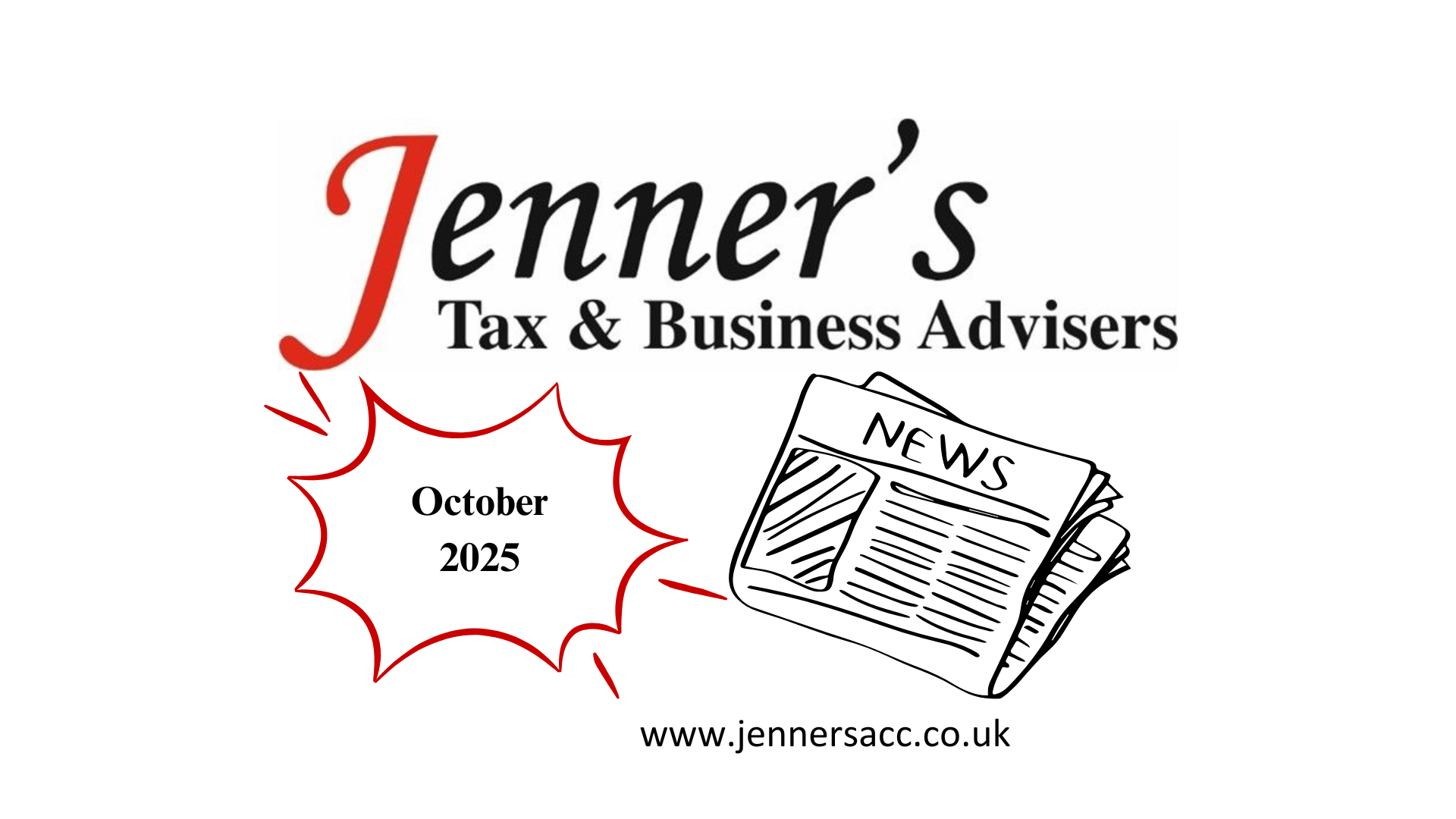
Your Monthly Tax & Business Update – October 2025
Welcome to your October update from Jenners Tax & Business Advisers, your trusted source for all things tax, accounting, and business advice.
Each month, we bring you the key HMRC deadlines, hot topics in the world of finance, and practical insights to help you stay compliant and confident in your business.
Important Tax Dates – October 2025
Here are the key dates to keep in mind this month:
- 1 October – Corporation Tax payment due for companies with a 31 December 2024 year-end.
- 5 October – Deadline to register for Self Assessment for the 2024/25 tax year (if you’re self-employed or have income to declare).
- 7 October – VAT return and payment due for the quarter ending 31 August 2025 (online).
- 19 October – Postal deadline for PAYE, NIC & CIS payment to HMRC.
- 22 October – Electronic deadline for PAYE, NIC & CIS payment to HMRC.
- 31 October – Paper Self Assessment tax return deadline for the 2024/25 tax year.
In the News – What Business Owners Need to Know
Budget 2025 on the Horizon
The Chancellor’s Autumn Budget is expected in November, and while we don’t yet know the details, topics likely to be on the agenda include business rates, corporation tax thresholds, and further support for small businesses. It’s a reminder that the rules can change — and being proactive with planning is always safer than waiting until the last minute.
👉 Jenners tip: Keep an eye on our updates next month. As soon as the Budget is announced, we’ll break it down into plain English and let you know what it means for you and your business.
Self Assessment Scope is Expanding
HMRC is writing to more people who now fall within Self Assessment, especially where changes to Capital Gains Tax or dividend allowances mean extra income needs to be declared. If you’ve had a letter from HMRC or aren’t sure whether you should be in the system, don’t ignore it. Filing early avoids penalties and gives you peace of mind.
👉 Jenners tip: If you’ve sold shares, property, or received extra income this year, check whether you need to register. We can confirm your obligations and get your paperwork in order.
Get Ahead of Self Assessment
Even if you’re planning to file your Self Assessment online by the 31 January 2026 deadline, October is the perfect time to get organised. If you still file on paper, remember the paper deadline is 31 October 2025.
By pulling your records together early, you’ll:
- Spot any missing documents (like bank interest, dividend vouchers, or CIS statements).
- Allow time to query any discrepancies with HMRC or clients.
- Have visibility of your tax liability months in advance, giving you time to budget or set up a payment plan if needed.
👉 Action point: Start gathering your records this month — it could save you stress and late-night panics in January.
Making Tax Digital – What Sole Traders Should Know
The move to Making Tax Digital (MTD) for Income Tax is edging closer. From April 2026, many sole traders and landlords earning over £50,000 will need to keep digital records and submit quarterly updates to HMRC. Those earning over £30,000 will follow in 2027.
October is a good time to review how you currently keep your accounts — spreadsheets and paper may no longer be enough.
👉 Jenners tip: Get ahead now. Switching to digital software this year gives you time to adjust and avoid a last-minute scramble.
Review Your Cash Flow Before Year-End
Autumn can be a challenging period for businesses — sales may slow before the Christmas rush, and costs like energy and staffing often rise. October is a smart time to forecast the next 3–6 months and check whether you’ll have the funds to cover bills, wages, and tax payments.
A clear cash flow review helps you:
- Identify pinch points in advance.
- Decide whether to delay or accelerate certain spending.
- Avoid dipping into overdrafts or loans unnecessarily.
👉 Action point: Block out an hour this month to review income, outgoings, and your HMRC deadlines — a simple spreadsheet or accounting software can give you clarity.
Don’t Miss CIS Deductions & Offsets
For those in the construction industry, October is a good checkpoint to ensure your CIS (Construction Industry Scheme) records are accurate and up to date. Subcontractors may be entitled to reclaim CIS deductions against PAYE or offset them against other liabilities.
Missing or incorrect CIS entries can lead to cash flow issues and HMRC penalties. Keeping on top of it now means:
- You avoid the year-end scramble to reconcile deductions.
- You don’t overpay tax unnecessarily.
- You can claim any offsets promptly to free up working capital.
👉 Action point: Double-check your CIS returns and records before submitting your October returns to avoid surprises later.
Plan Tax-Efficient Investments
With just six months left of the tax year, now is the right time to think about investments or big purchases. Whether it’s upgrading equipment, investing in energy-efficient assets, or planning R&D expenditure, timing matters.
Tax reliefs like the Annual Investment Allowance (AIA) can give 100% tax relief on qualifying purchases, and certain R&D costs may also qualify for relief. Planning now ensures:
- You spread spending sensibly rather than rushing before 5 April.
- You maximise available allowances.
- You keep cash flow balanced while still investing in growth.
👉 Action point: Review any major purchases on the horizon and speak to your accountant to ensure you’re maximising reliefs.
Client Q&A – This month’s Hot Topics
Q1: I’m a sole trader — do I need to register for Self Assessment every year?
A: No — once you’re registered, you stay in the system until you formally deregister. But if it’s your first year with self-employed income, you must register by 5 October.
Q2: Can I still file my tax return on paper?
A: Yes, but the paper deadline is 31 October. Most people now file online (deadline 31 January), which gives you more time and is usually quicker and easier.
Q3: I work in construction — how do CIS deductions affect my tax bill?
A: CIS deductions are treated like tax you’ve already paid. They can be offset against your Self Assessment bill or PAYE liabilities. Keeping your CIS statements safe and accurate is essential to avoid overpaying.
Q4: When is the best time to buy equipment to claim tax relief?
A: Relief like the Annual Investment Allowance is available in the year you make the purchase. Buying before your year-end ensures you can claim it sooner, but timing also depends on cash flow. Always check before making big decisions.
Need personalised advice?
If any of this month’s topics affect you or your business, we’re here to help.
Contact our team at Jenners Tax & Business Advisers for tailored support and practical guidance.
Check out all of services pages today.
Call us on 01432 379988 or use the contact us page.

